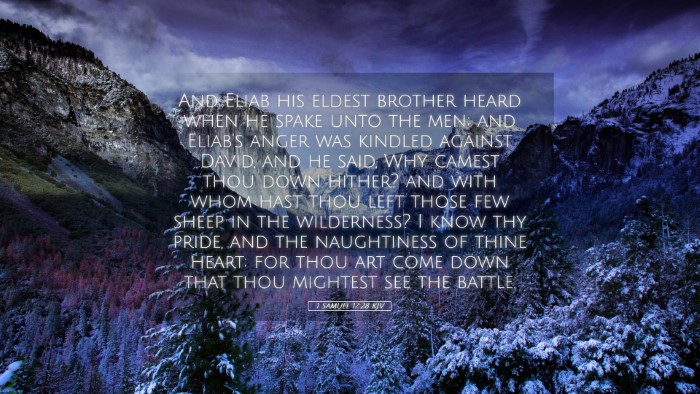Commentary on 1 Samuel 17:28
Verse: "And Eliab his oldest brother heard when he spake unto the men; and Eliab's anger was kindled against David, and he said, Why camest thou down hither? and with whom hast thou left those few sheep in the wilderness? I know thy pride, and the naughtiness of thine heart; for thou art come down that thou mightest see the battle."
Overview
The context of this verse is set within the grand narrative of David's rise to prominence in Israel. David, a shepherd boy, is summoned to provide help to the Israelite army facing the Philistine giant, Goliath. This moment encapsulates the tension between established authority and emerging potential, as reflected in the confrontation between David and his brother Eliab.
Contextual Analysis
David had been anointed king, but he was still fulfilling the humble role of a shepherd. When he arrives at the battlefield, Eliab's reaction reveals underlying family dynamics and societal expectations.
1. The Character of Eliab
Eliab, the eldest brother, represents cynicism and anger. His response to David is filled with scorn and a questioning of David's motives. According to Matthew Henry, this reaction can be interpreted as jealousy; Eliab feels threatened by David's emerging status and may reflect the insecurity that often accompanies authority.
2. David's Intentions
David's descent into the battlefield is misunderstood by Eliab, who accuses him of pride and abandonment of his responsibilities. However, as noted by Albert Barnes, David's intentions are pure—he seeks to understand the situation and support the Israelite cause. This contrast highlights the danger of assumptions based on external appearances.
3. Analysis of Pride
Eliab’s accusation of pride against David is significant. According to Adam Clarke, pride in this context can be seen as a misunderstanding of David's genuine faith and desire to honor God. Instead of pride, David embodies a humble reliance on divine strength. The rebuke shows a failure to recognize the work of God in David’s life.
Implications for Leadership
This passage carries vital lessons about leadership and perception. Eliab embodies the old guard who resist change, whereas David represents the new, divinely appointed leader. This dynamic is often seen in organizations and churches today.
- Recognition of God’s Anointing: Leaders must discern the hand of God in the lives of others, as David's anointing goes beyond human expectations.
- The Danger of Jealousy: Eliab's anger illustrates how jealousy can blind individuals to God's purposes.
- Understanding True Courage: David's courage is rooted in faith rather than familial support; this serves as a reminder of the importance of personal conviction.
Applications for Today
As theologians and pastors engage with this text, consider the following applications:
- Encountering Resistance: Like David, leaders may face skepticism from those around them, particularly from those closest to them. This challenge requires spiritual maturity and a commitment to one’s calling.
- The Importance of Humility: David’s humility, despite his anointing, serves as a model for future leaders. True leaders are those who serve with a heart aligned with God’s will.
- Responding to Criticism: David's calm response to Eliab's insults exemplifies how one can respond to detractors with grace, focusing on their mission rather than personal offense.
Conclusion
1 Samuel 17:28 serves as a poignant reminder of the tensions that arise in familial and leadership settings. The interaction between David and Eliab highlights critical themes of divine selection, jealousy, and the importance of humility in leadership. For those studying Scripture, this passage encourages reflection on our own hearts and attitudes toward the work of God in others. Spiritual leaders are called to recognize and empower emerging voices, just as David’s anointing was recognized at a moment when least expected.


